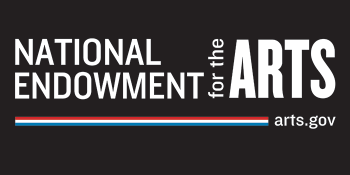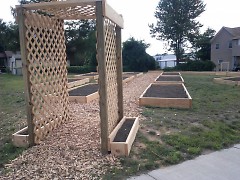Well House hopes to improve access to fresh, healthy food in the north end of the South East Community Assocation (SECA) neighborhood by creating a community garden for residents to grow and harvest vegetables. SECA is one of several food deserts in Grand Rapids.
The new garden on Sheldon Avenue and Pleasant Street was built to increase the amount of food grown in the area. Well House also has vegetable gardens and fruit trees at each property. These gardens are part of Well House's effort to provide access to fresh produce and raise awareness about its food justice philosophy.
"The goal is in part to sort of address food disparities that exist," says Jeff Smith, Well House Urban Gardener. "We're kind of operating from what we identify as a food justice lens, which is different than a food charity model. We're saying that there's something wrong with the existing food system that's inequitable. It's injustice and we want to rectify that by making sure that more people have a say in the kind of food they're going to eat, as well as making sure that it's affordable for people."
Well House will supply the seeds and vegetable plants. The organization invites the garden's neighbors to be as involved as they would like to be, says Camilla Voelker, an Urban Gardener at Well House.
"You can just help with the general maintenance of the whole garden space and then when stuff comes, you know, we just sort of share it amonst folks," says Smith. "But even if you don't do any work in the garden, we still want to make food available to people in the neighborhood because we recognize... it's not easy to find [fresh produce]. Even if you wanted to buy it, it would be expensive if you went to sort of traditional marketplaces because that's the nature of organic, non-GMO food. It's expensive."
Food grown from the garden may be given for free or for small donations to grow more vegetables, says Smith.
Fall crops that can be harvested within 40 to 60 days are currently being planted in the garden. Some crops have been started in Well House's greenhouse and are being transferred to the new community garden's raised beds, including snow peas, radishes and beets. Other Well Hosue gardens are growing kale, chard, cucumbers, and other greens.
Urban and community gardens have become an alternative for some city residents to get fresh produce, but Well House's food justice-driven model sets it apart, says Smith.
"We certainly encourage and love it when people are trying to be more food self-sufficient," says Smith. "But we also recognize that a lot of urban gardens are also being used just for commercial purposes, whether it's supplying restaurants or other markets. It sort of perpetuates the existing food system. We want the healthiest food to be available to anybody regardless of one's income [or] circumstances."
A grant from the Kellogg Foundation is being used to pay 10 Well House tenants to work 10 hours per week for six months to rehabilitate houses owned by Well House and work in the community gardens.
Well House has received positive feedback from community members, says Smith.
"The excitement has been great in terms of the support, as well as just people walking or driving by and saying 'That looks great,' or 'Thanks for what you're doing,'" says Smith. "It's very encouraging."
Well House offers workshops to help community members learn how to become food self-sufficient, says Smith. Classes offered include canning, seed saving, mushroom production and edible landscaping. Scholarships are avaibable for workshops.
The Rapidian, a program of the 501(c)3 nonprofit Community Media Center, relies on the community’s support to help cover the cost of training reporters and publishing content.
We need your help.
If each of our readers and content creators who values this community platform help support its creation and maintenance, The Rapidian can continue to educate and facilitate a conversation around issues for years to come.
Please support The Rapidian and make a contribution today.

